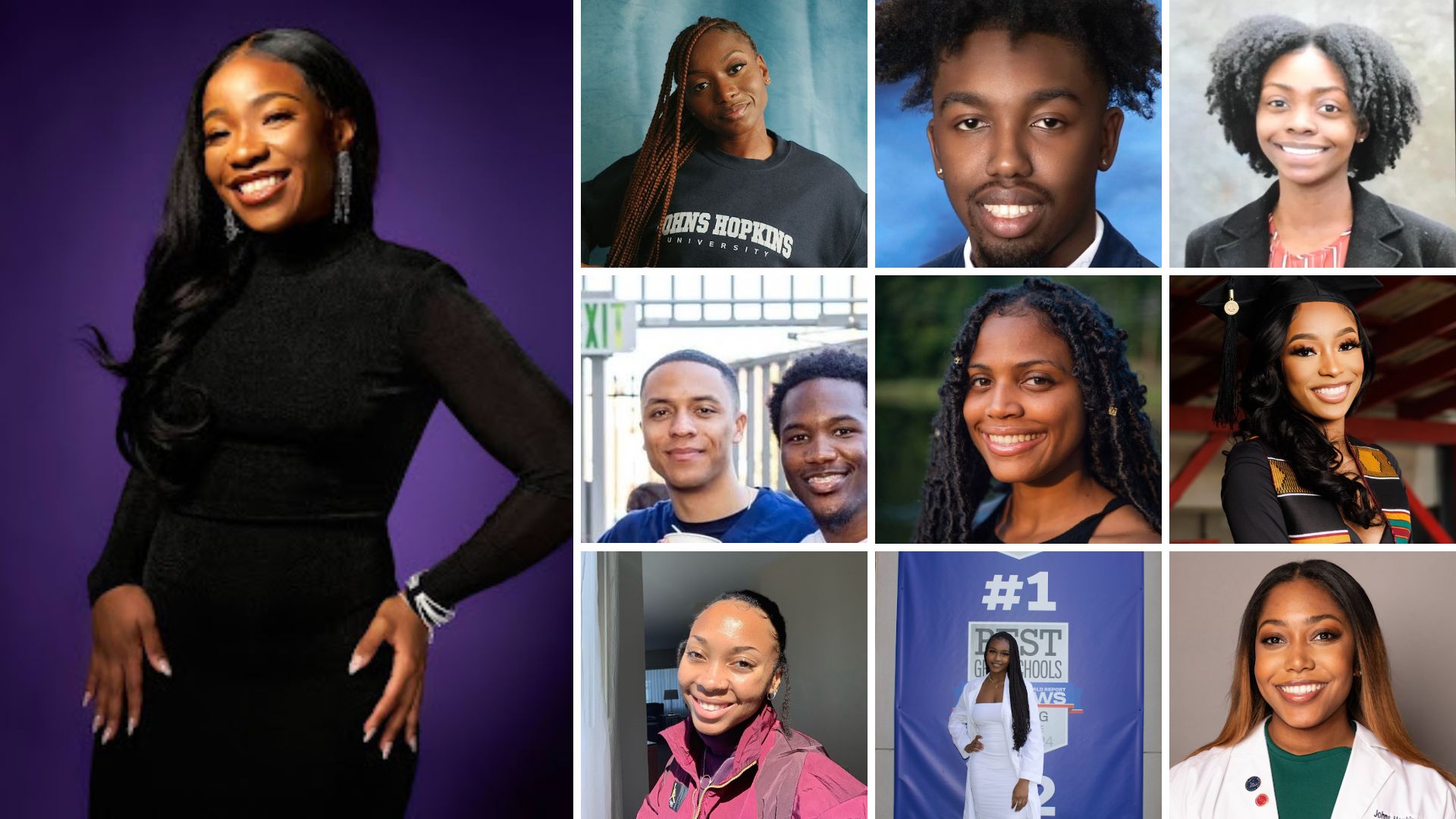In commemoration of Juneteenth, members of the Johns Hopkins School of Nursing Black Student Nursing Association (BSNA) reflect on their ancestry, the resilience of Black people, and what it means to them to be a Black nurse.
Kelsie Christine Watson: BSNA President

This Juneteenth, as a nursing student, I am reminded of the brave ancestors who remained steadfast until freedom was gained. Now, almost one hundred and sixty years later, I am reminded that representation still matters—in the world and in the field of nursing. Growing up, I didn’t always see people that looked like me in the nursing or medical field. Being a Black student nurse reminds me just how important it is to remember those that paved the way for me to be here. As a nursing student and future nurse, I am committed to continuing the legacy my ancestors created. I am committed to being a part of the positive change in the field. I am committed to reaching back, advocating, and supporting my people.
So this Juneteenth will be beautiful, surrounded by so many phenomenal future Black nurses that understand and are so appreciative of those who came before us and paved the way.
Miche Mouassami: Co-Administrative & BSNA Representee (Liaison)

As a black woman in nursing, the importance of black nurses is deeply personal and profoundly impactful. Growing up and seeing predominantly white faces in healthcare, I often felt a sense of detachment, like I was an outsider looking in. Black nurses are crucial in bridging this gap, providing culturally competent care, and serving as role models for aspiring healthcare professionals like myself. They bring diverse perspectives, advocate for marginalized communities, and help to dismantle systemic biases within the medical field. Their presence is not just inspiring; it’s essential for fostering a more inclusive, empathetic, and effective healthcare system.
Daelin Cook: BSNA Member

Being a black student nurse in the workforce is a great experience. It has allowed me to enter a field and not only diversify it, but bring in new perspectives. I feel like I am being a role model for other aspiring black nurses. This opportunity gives me the chance to challenge various stereotypes in healthcare and showcase the true meaning of black excellence. My presence as a black student nurse allows me to serve as a trusted and familiar figure for black patients. Allowing them to feel more comfortable and build trust in healthcare settings is very important in establishing stronger patient-provider relationships and improving overall healthcare experiences within the black community.
Kennedy Brown: Co-Communications & Social Media Marketing Chair

Juneteenth is my independence day. On this day my ancestors were declared free from the shackles of slavery and they were diligent in making contributions to society. Although free, we still had to fight for our rights, overcome several barriers, all while never giving up on hope. Juneteenth shows what we had to overcome, what we had to achieve, and this day is about celebrating the resilience of Black people. As a student nurse studying at Johns Hopkins, I will continue to advocate for the health and wellbeing of African Americans because often our concerns are undervalued leading to poorer health outcomes. Representation is necessary in the healthcare industry!
Mey Abellard: Co-Secretary

Black nurses in the workforce are critical for the promotion of equity, inclusivity, and improving health outcomes. Black nurses can help in addressing health disparities by ensuring and advocating for healthcare services that encompass the needs of Black patients. Black nurses serve as a role model for aspiring Black healthcare workers and little Black girls seeking their purpose in the world. Black nurses serve as reminder that a career in nursing is attainable as long as you have the passion and drive for nursing.
Bria Wallace: Co-Communications & Social Media Marketing Chair

Juneteenth and the role of Black nurses in healthcare emphasizes the importance of recognition, inclusion, and the ongoing struggle for equality and justice. It reminds us of the progress made and the work still needed to achieve a more equitable and just society. Black nurses in the workforce are frontline addressing health disparities that disproportionately affect African American communities which is crucial when discussing better healthcare access and education. Juneteenth and the role of black nurses highlights the contributions of African Americans and the history while recognizing the importance of representation, and ongoing efforts towards equality and justice.
Andrew Goldman (center): BSNA Member

The legacy of Juneteenth is pride in our achievements despite centuries of chattel slavery, disenfranchisement, and oppression. Although representation alone doesn’t resolve the issues currently endured by Black Americans, its importance in healthcare cannot be understated – especially when serving in a predominantly African-American community like Baltimore. Our patients deserve nurses who share a baseline connection to the Black experience, and I’m honored when patients say I remind them of their nephews or grandsons. As a Black man in nursing, I recognize that the true trailblazers are the Black women who came before me. Black women like my grandmother, who carved out their own place and built the well-respected profession that serves as the backbone of the healthcare industry today.
Dezneaire Billings: Treasurer

All across the world, Black people are disproportionately affected compared to other groups of people when it comes to healthcare. The lack of access to affordable healthcare, affordable housing and affordable foods contribute to the healthcare disparities seen within Black communities. Black nurses in healthcare represent what it means to overcome barriers in systems which were created to overthrow us which we have not let halt our dreams, accomplishments, and aspirations. Black nurses reverse the stigmas that are placed on us such as Black people are ignorant, Black people are lazy and that Black people are uneducated. Black nurses are more than just nurses, Black nurses are hope for future generations to come, inspiration for the young black children who doubt that they can succeed and are also the reason for the smile on their parents and grandparents faces.
Olivia Merchant: Vice President

This Juneteenth I am standing in solidarity with the lost lives and people living in a state of capitalistic colonialism that values monetary gain and power over human life. I am standing with Palestinians, Sudanese, Haitians, Congolese, Uyghur Muslims, enslaved people in Dubai and the UAE, and every other living and lost soul who is suffering at the ends of oppression. I am not free until everyone is free, my liberation is tied to yours, and Juneteenth reminds us that liberation is tangible.
Paige Stanford: Co-Peer Leader

Being a Black nurse means giving a voice to those who are ignored and looked down upon. It means providing the best care I can give and being 10 steps ahead of the “regular nurse.” Without Juneteenth, I would not be where I am today. My ancestors fought through trials and tribulations, yet continued to give love and kindness to those they encountered. I am a living representation of my ancestors and will continue to uphold what has been naturally instilled within me; determination, kindness, forgiveness, perseverance, and dedication to the advancement of not only myself, but those who come after me.
BSNA will be celebrating Juneteenth on June 22nd at AFRAM. All are welcomed to join! See flyer below. Bring your own Blanket & lawn chair


